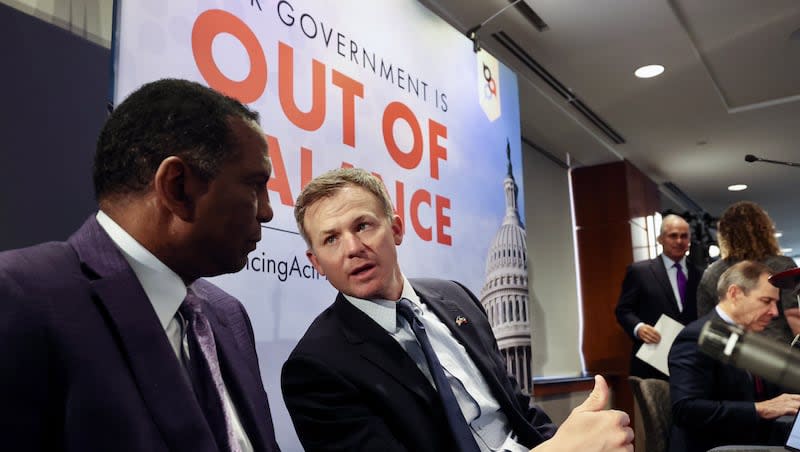Biden’s policies ‘unsustainable’: Utah Reps. Blake Moore and Burgess Owens respond to $1.9 trillion deficit

- Oops!Something went wrong.Please try again later.
- Oops!Something went wrong.Please try again later.
The report from the Congressional Budget Office released earlier this week painted a bleak picture as this year’s deficit is projected to hit $1.9 trillion, $400 billion more than initially predicted. Rep. Blake Moore, R-Utah, said the report “demonstrates just how unsustainable Biden’s economic policies are for our nation.”
“The causes of this continued downturn are wasteful government spending, crippling inflation, and the administration’s unwillingness to address the root causes of our debt drivers,” he said in a statement to the Deseret News. Moore is also vice chair of the Republican Conference and sits on the House Budget and Ways and Means committees.
Rep. Blake Moore’s 3-step plan to revive the economy
Moore said he plans to use his position to “recover and reform our economic outlook” through three strategies.
First, he said, Congress should craft “pro-growth tax policies” that help families and give the economy a boost. “Next year is huge for tax policy, and we are already preparing now on the Ways and Means Committee so we can hit the ground running,” Moore added. He is referring to the provisions in the 2017 Tax Cuts and Jobs Act, passed under former President Donald Trump, which is set to expire in 2025.
His second priority is eliminating waste in the federal budgeting process as part of the Budget Committee’s six-pillar “Reverse the Curse” blueprint. This would require repealing and reining in the Biden White House’s spending, reigniting growth through lower taxes, energy independence and America First trade policies, and reforming the budget process, he said.
Moore’s proposed Comprehensive Congressional Budget Act is a part of this and would require Congress to create a complete budget that includes all the spending and revenue.
Lastly, Moore wants to advance the Fiscal Commission Act. It would establish a commission chaired by 12 members of Congress and four outside experts without voting powers. This body would recommend long-term fiscal policy to rein in the ballooning debt.
The bill is a companion bill to the Fiscal Stability Act, introduced by Sen. Mitt Romney, R-Utah, and Sen. Joe Manchin, D-W.Va., in the Senate.
This idea has faced pushback from Democrats in the Budget Committee, who alleged in January that a commission will allow lawmakers to propose “unpopular cuts” to programs and entitlements such as Medicare or Social Security.
Democrats, including President Joe Biden, have suggested the deficit should be brought under control at least in part through tax hikes on the wealthy.
Blake addressed the criticism over entitlements after the District 1 GOP debate on June 10. “You have to be willing to talk Social Security,” he said. “Right now, we don’t vote on any of (the entitlement programs),” Moore said. “So, there’s no way to reform the programs until something catastrophic happens.”
The Social Security and Medicare trust funds are currently set to expire in the mid-2030s.
“My kids cannot expect the same program that exists now,” the Utah congressman said, adding he is open to exploring solutions.
Student loan forgiveness programs contribute to ballooning deficit
Romina Boccia and Dominik Lett, budget scholars at CATO Institute, a libertarian think tank, said in an article that a commission is “the most promising pathway to overcome the political barriers to reform and avoid a sudden financial crisis and economic decline.”
The only way out is to stabilize debt by “reducing spending and addressing unfunded entitlement program obligations,” like Medicare and Social Security, the researchers wrote.
This year’s expected $1.9 trillion deficit is about $400 billion more than what the federal budgeting office estimated earlier this year. As CNN reported, at least $145 billion of this spike can be attributed to the Biden administration’s student loan repayment efforts and proposed programs for forgiving accrued interest on loans.
“President Joe Biden gave hardworking Americans a bitter pill to swallow,” said Rep. Burgess Owens. “If you worked hard to pay off your college debt or decided not to attend at all, you’re still picking up the tab for someone else’s student loans.” Owens chairs the Higher Education and Workforce Development Subcommittee.
“This political ploy not only raises the projected federal budget deficit by 27%, but it also largely bails out expensive degrees for the top 60% of earners,” said Owens, who represents Utah’s 4th District. “Attending college is expensive, but throwing money at a problem is not leadership.”
He supports the College Cost Reduction Act. This bill seeks to make higher education more affordable by making information about costs and return on investment more accessible to students and holding universities financially responsible by funding those that demonstrate better student outcomes.
Could the U.S. enter a financial crisis?
The national debt currently sits at over $34 trillion. At this pace of spending, the CBO report projects the national debt will touch $50.7 trillion within the decade.
The CATO Institute researchers said the rising debt and interest rates will hurt the American people and shrink their incomes.
Unstable debt numbers can also provoke a financial crisis, as seen in Greece in 2009 and the U.K. in 2022, the researchers wrote. Another possibility is the “debt doom loop,” where “increasing the cost of servicing the national debt ... leads to more borrowing just to pay the additional interest on the debt.”
“Of course, the U.S. has many advantages,” the analysis said. This includes “providing the world’s primary reserve currency, strong financial institutions, transparent government fiscal reporting, a large economy, and debt that is primarily held by domestic institutions and investors.”

